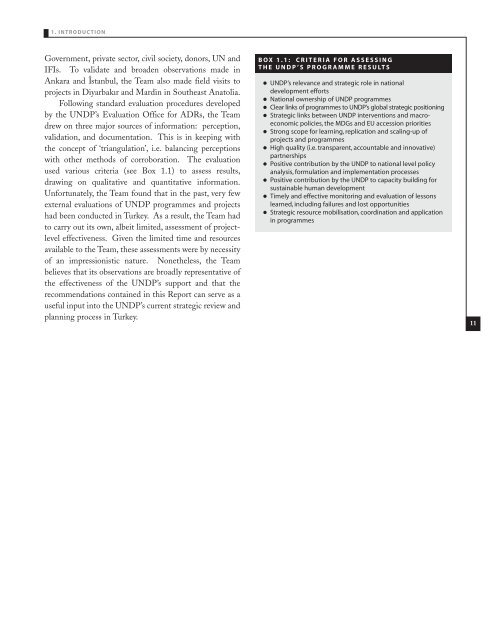Reports - United Nations Development Programme
Reports - United Nations Development Programme
Reports - United Nations Development Programme
Create successful ePaper yourself
Turn your PDF publications into a flip-book with our unique Google optimized e-Paper software.
1. INTRODUCTION<br />
Government, private sector, civil society, donors, UN and<br />
IFIs. To validate and broaden observations made in<br />
Ankara and I˚stanbul, the Team also made field visits to<br />
projects in Diyarbakır and Mardin in Southeast Anatolia.<br />
Following standard evaluation procedures developed<br />
by the UNDP’s Evaluation Office for ADRs, the Team<br />
drew on three major sources of information: perception,<br />
validation, and documentation. This is in keeping with<br />
the concept of ‘triangulation’, i.e. balancing perceptions<br />
with other methods of corroboration. The evaluation<br />
used various criteria (see Box 1.1) to assess results,<br />
drawing on qualitative and quantitative information.<br />
Unfortunately, the Team found that in the past, very few<br />
external evaluations of UNDP programmes and projects<br />
had been conducted in Turkey. As a result, the Team had<br />
to carry out its own, albeit limited, assessment of projectlevel<br />
effectiveness. Given the limited time and resources<br />
available to the Team, these assessments were by necessity<br />
of an impressionistic nature. Nonetheless, the Team<br />
believes that its observations are broadly representative of<br />
the effectiveness of the UNDP’s support and that the<br />
recommendations contained in this Report can serve as a<br />
useful input into the UNDP’s current strategic review and<br />
planning process in Turkey.<br />
BOX 1.1: CRITERIA FOR ASSESSING<br />
THE UNDP’S PROGRAMME RESULTS<br />
UNDP’s relevance and strategic role in national<br />
development efforts<br />
National ownership of UNDP programmes<br />
Clear links of programmes to UNDP’s global strategic positioning<br />
Strategic links between UNDP interventions and macroeconomic<br />
policies, the MDGs and EU accession priorities<br />
Strong scope for learning, replication and scaling-up of<br />
projects and programmes<br />
High quality (i.e. transparent, accountable and innovative)<br />
partnerships<br />
Positive contribution by the UNDP to national level policy<br />
analysis, formulation and implementation processes<br />
Positive contribution by the UNDP to capacity building for<br />
sustainable human development<br />
Timely and effective monitoring and evaluation of lessons<br />
learned, including failures and lost opportunities<br />
Strategic resource mobilisation, coordination and application<br />
in programmes<br />
11

















